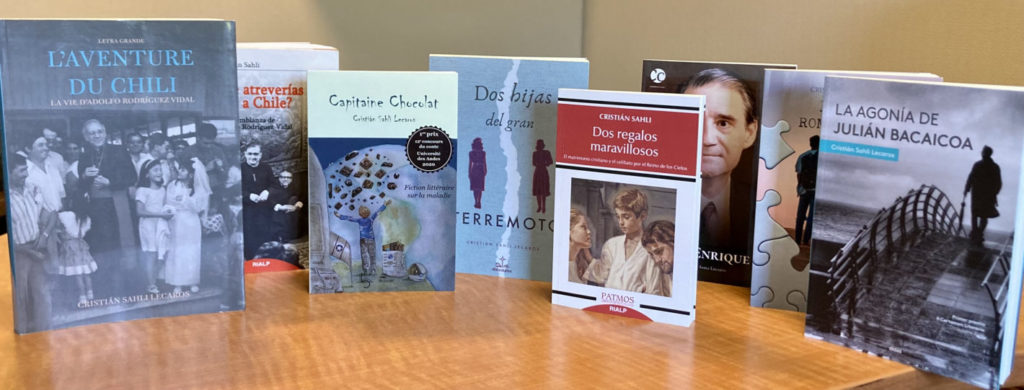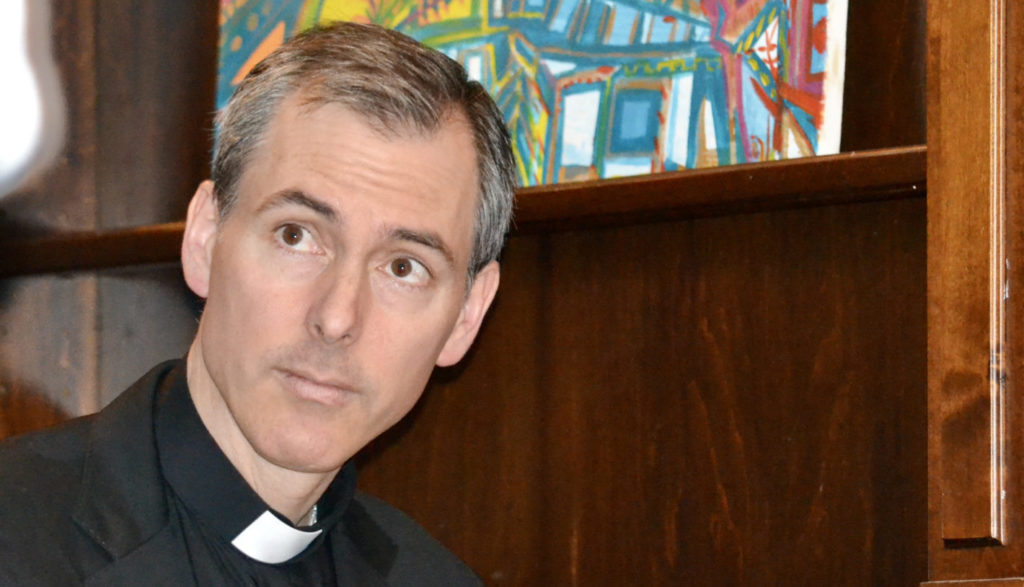Throughout history there have been many Catholic priests who have written books of various kinds. Theologian writers such as St. Thomas Aquinas and, in contemporary times, Joseph RatzingerOthers who have published ascetic works such as St. Alphonsus Liguori and St. Josemaría Escrivá; priest poets such as José Miguel Ibáñez; disseminators of the Catholic faith such as Leo Trese; priest historians such as Hubert Jedin and José Orlandis.
Less frequent are the priests who have written novels such as saint John Henry Newman. This is the case of Cristian Sahli (1975), Chilean, with a degree in Law and a doctorate in Canon Law, priest since 2010. In the last five years he has published biographical books, novels and short stories in Chile, Spain and France. He has received awards in Spain and Chile. His biographies include Would you dare to go to Chile? A portrait of Adolfo Rodríguez Vidal (he is the pioneer priest of Opus Dei in Chile, who arrived in 1950), published by Rialp, and José Enrique. Among his novels are The agony of Julian Bacaicoa (Didaskalos, 2019), a juvenile: The big puzzle (Palabra, 2020); another realistic-historical: Two daughters of the great earthquake (Didaskalos, 2021). He has written the short story entitled Captain Chocolateanother Christmas one called A lucky donkey and an award-winning micro-story. He has also ventured into the spiritual theological field with Two wonderful gifts (Rialp, 2021), on Christian marriage and celibacy.
Through these books we can appreciate his interest in spreading the knowledge of a valuable life, entertaining and transmitting positive messages. His biographical sketch and his works can be found at www.cristiansahliescritor.cl.
Cristián, your literary vocation is relatively late, since your first book appears in 2017. What motivates you to write?
I would say that the ripe fruits are late, but I always had a penchant for writing. In high school I won some contests, I made a bulletin for the class, and in college, a periodical. I can't explain the origin of my taste for writing, but it probably comes from an innate creative desire. My current motivation for writing stems from the possibility of transmitting, to a tired and often hopeless world, examples of successful lives and ideas of human and spiritual content.
You have ventured into several literary genres. Do you consider yourself a multifaceted author or have you not yet found your true niche as a writer?
I consider myself an amateur who has the desire to grow and better fulfill his vocation and profession, so I try to improve myself and face new challenges. I began with biographical sketches, then I ventured into literary fiction, and finally I published my first spiritual book. I try to develop each style respecting its own rules. There is nothing more repulsive than trying to read a moralizing or implausible novel.


How can you write fiction in Christian?
Fiction has its own rules and does not talk about religion. However, the characters in a good novel make decisions that always carry with them a moral value. That is where the true value of a literary text comes into play, in the relationship of those actions with happiness. Edith Wharton said that "a good theme, then, must contain within itself something that sheds light on our moral experience. If it is incapable of this expansion, of this vital irradiation, then, however showy the surface it presents, it is no more than a mere out-of-place occurrence, a meaningless piece of fact torn out of its context." That's what I'm trying to do, to make the characters show their humanity, and for them to show it fully, their orientation to the divine is necessary. I remember reading that Evelyn Waugh once said that characters without reference to God are not true characters.
Do you see any relationship between literary fiction and catechesis?
Yes, in terms of renewing the way of transmitting the faith to each generation. In this regard, it is worth recalling the words of Pope Francis in Evangelii GaudiumIt is desirable that each particular Church encourage the use of the arts in its evangelizing task, in continuity with the richness of the past, but also in the vastness of its present multiple expressions, in order to transmit the faith in a new way". parabolic language. We must dare to encounter the new signs, the new symbols, a new flesh for the transmission of the Word, the diverse forms of beauty that are valued in different cultural settings, and even those unconventional modes of beauty, which may be of little significance to evangelizers, but which have become particularly attractive to others".
How do you choose topics for your novels?
I want the plot and the lives of the characters to be marked by the deep moral dilemmas of existence. The old and successful doctor, Julián Bacaicoa, wonders in his agony if his life has been happy. Miguel Russo and Almudena, his companion, are wondering, as they leave adolescence, what are the appropriate choices for a life full of possibilities, as many as the pieces of a big puzzle. Amelia Candau and Erika Baier, after the unparalleled catastrophe of the Valdivia earthquake and tsunami, face the dilemma of giving meaning to their lives after experiences of pain and death. All my writings speak, deep down, of the redeeming value of love.
And what is your opinion of today's readers?
It is said that novels have different reading levels, and that is why there are different types of readers, who decipher more or less messages in the text. Some are content with mere distraction, others notice historical, psychological, geographical, sociological elements, but only the most cultivated readers discover the anthropological background. I have the best opinion of the readers, and I hope that in reading it everyone will be able to access the third level. For my part, I try to base my works on a Christian anthropological vision and it is up to the readers to judge whether I succeed.
Why treat Christian marriage and celibacy together in your spiritual book "Two Wonderful Gifts"?
Because these are two great loves on which the whole existence of a person can be based, and although they are different, they have many points in common. Both are paths to happiness, since they allow us to give ourselves and to receive from others; both are fruitful realities, which enable us to live fatherhood and motherhood, provide companionship, and allow us to live with God in a special way.
In the de-Christianized culture in which many Western countries live, celibacy is considered a rarity from ancient times. What is your contribution to a greater understanding of celibacy in "Two Wonderful Gifts"?
Celibacy has been hidden from the horizon of many young people because to understand it requires faith. The person who lives celibacy for the sake of the Kingdom of Heaven renounces marriage because he or she accepts an invitation from God to love him without sharing his heart and to occupy himself more immediately with his divine projects in the world. Perhaps my contribution can be expressed in these words from the book: "I think that the celibate person for the Kingdom of Heaven must be defined on the basis of what he has received and not on what he lacks. It is true that he has not married and will not marry, but the most important thing is not what he has left. The main thing is that she has found something that is better for her, a gift that she has received in addition".
Any new literary projects in the pipeline?
God willing, there will be a book of illustrated Christmas stories, and a biographical sketch of a Chilean priest who exercised his pastoral ministry in Africa.












